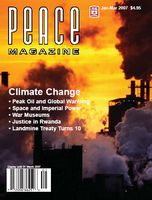
Peace Magazine Jan-Mar 2007, page 31. Some rights reserved.
Search for other articles by PMag staff here
The long insurrection of Maoists in Nepal is ending. There had been two unsuccessful ceasefires and peace talks in 2001 and 2003, but the third one concluded successfully after the monarchy responded to a mass uprising and ended direct rule.
The UN will deploy 35 monitors of arms and armies to assist in managing former Maoist rebel soldiers. The Secretary-General's personal representative in Nepal, Ian Martin, is advising the preparations for an election to the Constituent Assembly, scheduled for June 2007.
A 62-year-old career diplomat, Ban Ki-Moon of South Korea, takes office on January 1 for a five-year term as United Nations Secretary-General.
In his first press conference he revealed some of his priorities, which include becoming directly engaged in efforts to bring peace to Sudan's Darfur region. In late January he will travel to an African Union summit dealing with the issue.
Ban also mentioned the Middle East as a priority. He will try to "energize" an Israeli-Palestinian peace plan proposed by the so-called Quartet of Middle East peacemakers: the United Nations, the European Union, Russia, and the United States.
Gareth Evans, President of the International Crisis Group, delivered an address to the Foreign Policy Association on 6 December, 2006. He noted that November was the worst single month for conflict prevention in several years. Situations were deteriorating in Burundi, the Central African Republic, Chad, Cote d'Ivoire, Somalia, Sudan, Iraq, and Lebanon. There were seven new conflicts, and in only three locations (Nepal, Senegal, and Kyrgyzstan) was improvement visible. Despite this bad news, Evans reported encouraging news too -- a significant decline since the early 1990s in
"the number of wars taking place, both between and within states, in the number of genocidal and other mass atrocities, and the number of people dying violent deaths as a result of them. There are now 40 percent fewer conflicts taking place than there were in 1992. In the case of serious conflicts (defined as those with 1000 or more battle deaths in a year) and mass killings there has been an 80 percent decline since the early '90s, and an even more striking decrease in the number of battle deaths..."
Evans noted the marked decline in wars between governments. Current wars are within state borders, or -- as in this summer's Lebanon war -- between states and non-state actors. Terrorism is worse but "even here the annual death toll remains only a small fraction of the war death toll."
There are several possible explanations for this overall improvement, but Evans accepted the conclusion of Canada's Human Security Centre on the subject. It acknowledges the
"huge upsurge in activity in conflict prevention, conflict management, and post-conflict peacebuilding activity that has occurred over the last fifteen years, with most of this being spearheaded by the much maligned UN, but with the World Bank, donor states, a number of regional security organizations and literally thousands of NGOs playing significant roles of their own -- not least my own International Crisis Group, which didn't exist until 1995...
"We are getting better all the time at early warning and early reaction, with last year's efforts to head off another catastrophe in Somalia...being a good case in point. We are doing better at diplomatic peacemaking, with successes from Cambodia to the Balkans to Northern Ireland to West Africa to Nepal and Aceh well outnumbering in recent years what remains so far the failures, e.g. in Sri Lanka and Darfur: many more conflicts have ended than have begun during the post Cold War years."
The seventh world summit of Nobel Peace Prize laureates met in Rome November 17 to 19. Their declaration focused on the problem of nuclear weapons.
"There are over 27,000 of these devices threatening civilization, with over 95% in the hands of Russia and the US....
"The current situation is more dangerous than during the Cold War. We are gravely concerned regarding several current developments such as NPT stakeholders enabling rather than constraining proliferation, modernization of nuclear weapon systems, the aspiration to weaponize space, thus making arms control and disarmament on earth all the more difficult..."
For more details please see <nobelforpeace-summit.org>
Peace Magazine Jan-Mar 2007, page 31. Some rights reserved.
Search for other articles by PMag staff here